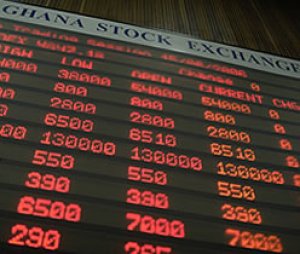The stock market seems to have caught the terrible cold that is plaguing the country’s economy, with shrinking trading volumes and investment returns compared to a year ago.
Rising inflation, the falling currency and lingering fiscal risks have left investors sitting on the fringes of the market, not certain about its direction, according to stock analysts.
First-quarter returns on the bourse, which hit 44 percent in 2013, fell to 11.2 percent this year, while the volume of shares exchanged dropped by 45 percent from 91 million to 41 million. In value terms, trading was down by almost 10 percent from a year ago.
The market’s performance in the second quarter has been more depressing, with year-to-date returns plummeting to 5.2 percent as at Monday from 11.2 percent at the end of March.
According to Samuel Ampah, analyst and Head of Research at Gold Coast Fund Management, uncertainty, caused by difficult economic conditions, has gripped the market.
“This uncertainty is dampening investor confidence,” he said, adding that with most European markets recovering from slow growth, some investors are turning their attention there. “Clearly, there’s a level of capital flight within the market.”
Yaw Adu-Koranteng, a research analyst with NDK Asset Management, said the spate of bad economic news Ghana has produced lately has dampened confidence among investors, who are selling-off their investments to realise the gains made from last year’s rally.
Fitch’s downgrading of the country’s sovereign rating and the cedi’s huge losses against other currencies has shaken confidence, he said, with foreign investors particularly worried about profit losses due to the weak exchange rate.
The botched attempt to introduce a 17.5 percent Value Added Tax on financial services also weighed heavily on financial stocks listed on the market, Mr. Ampah said. After posting returns of 49.2 percent in the first quarter of 2013, the Ghana Stock Exchange (GSE)’s financial stocks index saw its performance dip to 17.1 percent in the same period of 2014. This has further dropped to 7.2 percent, Monday’s trading results showed.
“Investors were not sure of how financial stocks would react to the impact of the 17.5 percent VAT to be imposed on financial services. In essence this came to muddy financial stocks,” Mr. Ampah said.
Reversing the current economic trend will require strong efforts to contain the fiscal deficit, rein-in the sliding cedi and rising consumer inflation, said Gold Coast Fund Management in its stock market report for the first quarter of the year.
Government’s fiscal budget aims to slash the 10.8-of-GDP deficit recorded in 2013 to 8.5 percent in 2014, and last week’s successful wage negotiations with workers, in which government settled for a 5 percent cost-of-living adjustment to public sector workers’ wages, was seen as a positive step towards limiting the exponential growth in wage expenditure in recent years.
Mr. Ampah said in spite of how the economic situation develops, the GSE will probably end the year with not-less-than-5-percent returns, an outcome that would pale in comparison to the 78.8 percent returns in 2013.
Business News of Wednesday, 7 May 2014
Source: B&FT













